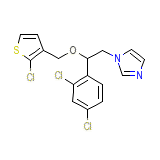N-Phthaloylglutamimide




N-Phthaloylglutamimide Brand names, N-Phthaloylglutamimide Analogs
- Algosediv
- Asidon 3
- Asmadion
- Asmaval
- Bonbrain
- Bonbrrin
- Calmore
- Calmorex
- Contergan
- Corronarobetin
- Distaval
- Distaxal
- Distoval
- Ectiluran
- Enterosediv
- Gastrinide
- Glupan
- Glutanon
- Grippex
- Hippuzon
- Imida-Lab
- Imidan
- Imidene
- Isomin
- Kedavon
- Kevadon
- Lulamin
- N-Phthalimidoglutamic acid imide
- N-Phthaloylglutamimide
- N-Phthalylglutamic acid imide
- Neaufatin
- Neo
- Neosedyn
- Neosydyn
- Nerosedyn
- Neufatin
- Neurodyn
- Neurosedin
- Neurosedym
- Neurosedyn
- Nevrodyn
- Nibrol
- Noctosediv
- Noxodyn
- Pangul
- Pantosediv
- Poly-Giron
- Polygripan
- Predni-Sediv
- Pro-ban M
- Profarmil
- Psycholiquid
- Psychotablets
- Quetimid
- Quietoplex
- Sandormin
- Sedalis
- Sedalis sedi-lab
- Sedimide
- Sedin
- Sedisperil
- Sedoval
- Shin-naito S
- Shinnibrol
- Sleepan
- Slipro
- Softenil
- Softenon
- THALOMID
- Talargan
- Talimol
- Talismol
- Telagan
- Telargan
- Telargean
- Tensival
- Thalidomide 99%
- Thalidomine USP26
- Thalin
- Thalinette
- Theophilcholine
- Ulcerfen
- Valgis
- Valgraine
- Yodomin
- alpha-phthalimidoglutarimide
N-Phthaloylglutamimide Brand Names Mixture
- No information avaliable
N-Phthaloylglutamimide Chemical_Formula
C16H13Cl3N2OS
N-Phthaloylglutamimide RX_link
http://www.rxlist.com/cgi/generic3/tioconaz.htm
N-Phthaloylglutamimide fda sheet
N-Phthaloylglutamimide msds (material safety sheet)
N-Phthaloylglutamimide Synthesis Reference
No information avaliable
N-Phthaloylglutamimide Molecular Weight
387.711 g/mol
N-Phthaloylglutamimide Melting Point
No information avaliable
N-Phthaloylglutamimide H2O Solubility
No information avaliable
N-Phthaloylglutamimide State
Solid
N-Phthaloylglutamimide LogP
4.971
N-Phthaloylglutamimide Dosage Forms
Cream; Ointment; Suppository (each applicator-full provides approximately 4.6 grams of ointment containing 300 mg of tioconazole)
N-Phthaloylglutamimide Indication
For the local treatment of vulvovaginal candidiasis (moniliasis).
N-Phthaloylglutamimide Pharmacology
Tioconazole is a broad-spectrum imidazole antifungal agent that inhibits the growth of human pathogenic yeasts. Tioconazole exhibits fungicidal activity in vitro against Candida albicans, other species of the genus Candida, and against Torulopsis glabrata. Tioconazole prevents the growth and function of some fungal organisms by interfering with the production of substances needed to preserve the cell membrane. This drug is effective only for infections caused by fungal organisms. It will not work for bacterial or viral infections.
N-Phthaloylglutamimide Absorption
Systemic absorption following a single intravaginal application of tioconazole in nonpregnant patients is negligible.
N-Phthaloylglutamimide side effects and Toxicity
Symptoms of overdose include erythema, stinging, blistering, peeling, edema, pruritus, urticaria, burning,
N-Phthaloylglutamimide Patient Information
N-Phthaloylglutamimide Organisms Affected
Yeast and other fungi














